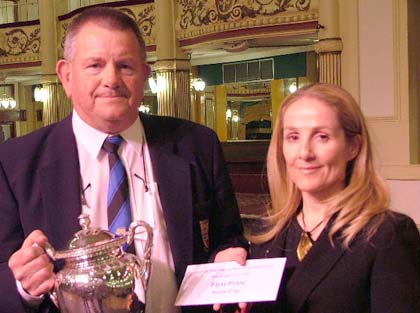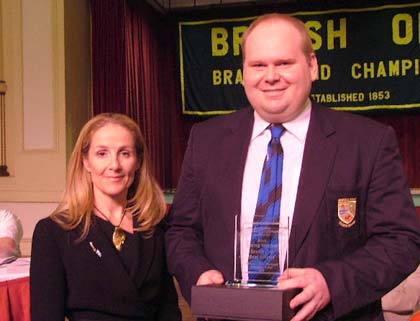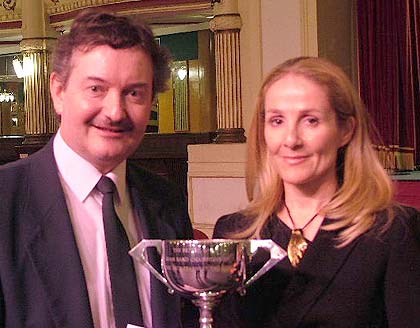2005 Spring Festival - Retrospective: Senior Cup
11-May-2005Montage proved to be one heck of a test for the bands in the Senior Cup, but the winners perhaps took inspiration from the set work in the Grand Shield, and left with the last laugh - especially over 4BR!

Burry Port: Winners of the Senior Cup
There were more than a few eyebrows raised when it was announced that Peter Graham's ‘Montage' would be used as the test piece for the Senior Cup. Coming just a few months after its selection for the British Open itself (when only five of the very best bands chose it as their own choice selection), you did wonder how the bands here would fair on the piece that was in effect being played in a contest two sections lower down.
The answer was that it was too much for nearly all of them on the day. There were some fine efforts indeed, but in truth not one would have troubled the judges at the Open last September.
A year ago in fact, Eric Ball's ‘Journey into Freedom' proved to be a severe test for a good number of bands in this section, and twelve months on, you had sympathy for the contenders here with the challenge of Graham's masterful work. These are of course as different as chalk and cheese, but it was still fairly obvious that far too many MDs here have had an aversion to this musical Wensleydale.
‘Montage' would have been one heck of a challenge for the Grand Shield participants, let alone the Senior Cup, but the bands have to be commended for their efforts. Those of you that have read our live coverage might feel we were being over critical, but we were only giving our opinion on what we were listening too – and at times it wasn't good.
This however doesn't mean that the bands were below par, far from it; the piece was too demanding a test and even those that featured in the frame didn't get away unscathed on the day.
Derek Broadbent in the Empress Ballroom prior to the announcement of the results referred to ‘Montage' as, "…an absolute classic test piece" and "It is very demanding in the long solo sections. The bands must meet," he said, "both the technical and musical difficulties that it sets out."
Derek Broadbent is one of the most interesting judges to hear speak at the conclusion of a contest he has adjudicated upon, and this time was no different. You need to listen very carefully to what he does, and doesn't say, as both tell you a great deal about his feelings.
Earlier this year we heard him give a superb summing up of another ‘classic' test piece in the form of the Vaughan - Williams ‘Variations for Brass Band' in the North East, where he rightly castigated the MD's more than the players themselves for a lack of musical insight, especially in respect to the markings on the score.
Obliquely, he did so again here with accurate comments on the lack of ‘Maestoso' feel in the opening movement, especially in the semi quaver work that is so prevalent and absence of the ‘Cantabile' lyricism the second. Tellingly, he didn't mention the third – technically the most difficult movement of the piece, and one that on the day was a minefield of errors and misinterpretation.
He congratulated the "general high standard" of what he heard, and also the standard of the soloists, but it was another expertly delivered summation that once more highlighted the musical shortcomings rather than the technical achievements of the performers and their conductors.
Contesting being what it is, some of the placings for the bands raised more than one or two eyebrows. The bands that have for qualified for the Grand Shield deserve to be there on merit as they gave performances that were of a better standard than others in the ears of the judges, but there were still one or two that surprised us and many who heard all the bands on the day.
As always though, the judgement that counted came from the men in the box – not 4BR (although the green ink brigade who barrage us with their e mails of disgust tend to forget this), but we would add that we were one of the very few (and we do mean very few) who actually listened to all the bands on the day.
Burry Port Town's win surprised us (and even some of the players judging by their body language as they walked off stage) as we had them outside the top six and thought they found the piece was a little too much for them.
How wrong could we be? It's easy to say after the event, but perhaps what gave Burry Port the nod on the day was the middle movement. For us it just didn't have the impact required, but it had some musical moments particularly from the band's euphonium player (that helped take the solo prize) that impressed – but still for us it just didn't stand out. It certainly did for the adjudicators and that's all that matters.
The ending of the first movement had some fine playing from the soprano seat and the opening of the final movement was also well produced, but despite some nice solo lines, the ending just didn't make us go and say ‘that will be in the frame'.
However, when we spoke to Malcolm Brownbill, he thought theirs was a performance that really impressed them in the box, and in particular the euphonium playing in the middle movement, which he described to us as "outstanding" in what was a "very good overall performance – full of quality playing."

Best Instrumentalist: Ceri John - Burry Port
Ceri John was the young man who delivered it, and over the years he has been a quite outstanding player, and it means that both he and his band can now enjoy putting two musical fingers up to 4BR and look forward to taking their place in the Grand Shield next year. That's the beauty of contesting.

Staffordshire: Second place
The winner for 4BR though, and, it must be said, for many in the hall by a long way, was Staffordshire under the direction of Steve Bastable. The Midlanders followed Burry Port on stage and produced an extremely musical performance that was for many, head and shoulders above any other band.
They never sounded in trouble with a fine opening, and handled the technical side without any problems. Paul White on solo cornet put his mark of authority on the whole performance as a whole, whilst in the middle movement, there were some magical moments, when the MD sought and caught the subtleness of the musical writing, much as he had done with Kirkintilloch at the British Open.
By the time the band was coming to the end of its performance, you sensed they would add the Senior Cup to the Senior Trophy they won last year, and even though the band looked subdued at the end, (and afterwards when we met a couple of them in the bar) they have to be delighted with the progress that they are making.
In their separate ways both of these bands will relish the challenge of the Grand Shield next year, and as they have shown in the past two years, both are more than capable of making it to the Open itself. We will watch their progress with interest.
Meanwhile third placed Wooley Pritchard Sovereign put on a show that reinforced why they took the honours at the Regional Championships in March. It wasn't a winner for us, but was always likely to be in the frame with plenty of quality on display around the stand. David Maplestone, the former British Open Solo Champion was superb throughout and was the best cornet soloist for us in the middle movement on the day.
As with Staffordshire, they never struggled at all with the piece (although it was not error free by a long way) and Trevor Jones and this band is certainly moving in the right direction, with a head of steam that could see them make a mark come the National Finals in October.
Freckleton took the last priceless qualification place on offer after playing off the number five draw to set the marker for the rest to follow. The local band reinforced why they qualified for the National finals in Harrogate in the First Section with a confident display that wasn't without the odd glitch (the middle section causing the biggest challenges).
They never sounded like the piece was too much for them though and whilst they found it a severe challenge they deserved to be in the frame. It was also interesting to see conductor Paul Dalton in the hall after they'd played for the remainder of the contest, listening to other bands to see how they coped with the demands of the piece.
Paul probably knew what we did - they hadn't produced a winning performance, but as the day went on, he would have grown in confidence that they had done enough to take the last qualification place for the Shield.
BTM will perhaps have been the one band really kicking themselves on the way home. Thomas Wyss was an interested listener early on in the contest and from what he had heard, must have gone away with an air of confidence hoping they would do well.
The band promised plenty of quality but they never produced it consistently throughout the three movements to take one of the top four places. The openings to movements two and three must have cost valuable points through lack of concentration and untidiness, and in the end it cost them, as much of what else had gone on was as good as anything heard on the day.
Outside the top five, it was probably a tough job for Derek Broadbent and Malcolm Brownbill to place bands in order of merit, as the standard fell away – quite alarmingly in the bottom half.
Those placed six to ten all had something about them on the day that showed they were close to just about conquering the piece, but it was consistency of quality that robbed them all. ‘Montage' is too difficult a piece to lose concentration on or to make too many unforced errors, and these performances were littered with both.
Examples of this were the opening and closing clusters in the second movement in the cornet section that lacked balance and precision. Also, the rushed semi quaver work in the opening movement (particularly highlighted not in the semi quaver runs but in the semi quaver pick ups in the euph to open and the soprano to close), and the lack of balance and error count in the soprano/tuba opening to the third. This invariably led to poor trom work later, more than a bit of guess work in the cornet/xylophone shock notes and overblown endings with ralls to finish that were not marked or needed.
The final movement portrays the flight of an arrow it is said by the composer, from its release to the time it hits its target – some arrows wouldn't have broken through wet toilet paper, so slow were they travelling in the last two bars for many.
That said, Unison Kinneil, Bournemouth Concert and Newstead Welfare all produced performances of merit but weren't able to produce musical readings that were consistent throughout that would challenge the leaders.
Unison deserved to feature in the top half with an interpretation from Andrew Duncan that had plenty of time and space for the players to revel in, but it just didn't come off as they would have hoped and they had to be content with 6th place.
Meanwhile, Bournemouth struggled early on but if they had reproduced the latter stages of their performance at the beginning, could well have challenged for a spot in the Shield. Newstead were also solid enough without ever quite making you sit back and enjoy, but Duncan Beckley crafted a performance that wasn't going to ask the band to do produce more than they actually could.
Wingates under Phillip McCann came in 9th and were unlucky not to have come higher – we had them in third place behind the two Midlanders. Playing off a number seven draw, it had the edge for us over Freckleton, and had a quality about it that was not dented by the error count. The percussion work didn't have the overall desired effect though, with the shock notes in the last movement way out, and it sadly for them proved costly, as Mr McCann's interpretation was perhaps the best of the day.
For the rest though they were never going to feature on the day and so many bands struggled with the overall demands of the piece. The exception to this though was Newtongrange under Allan Ramsey who must have been as dumbstruck as us to discover they'd come 18th.
For us, it was a very musical reading by the MD and they never sounded in any real discomfort. All bands had the odd moment of uncertainty and the Scottish Regional Champions were no different from anyone else, and although the soprano had a day to forget, the performance had musical moments for us that very few matched on the day. We had them 5th – but then, as the final result showed, what do we know?
Stocksbridge followed Staffordshire onto the stage but didn't produce the commanding performance that some in the hall thought they might with the second movement being their highlight of an uneven show, whilst Dobcross and Simon Stonehouse deserve acknowledgement for producing a fine reading that had its moments, and perhaps could have finished higher than eighth.
The MD stepped in at the last minute to cover for Denis Hadfield who became father just days before the contest and the Saddleworth-based band chose to have the sop and bass player standing at the side of the band at the start of the third movement and whilst different, it wasn't effective at all, and just seemed a risk that wasn't worth taking.
Newtongrange aside, we wouldn't argue about the way the other bands were placed on the day. Langanvale and the United Co-op bands of Yorkshire and Crewe found it hard going from start to finish and could either write the day off as one that they didn't play anywhere near to recent form, or more possibly lacked rehearsal time, whilst Bo' ness, Drighlington, Knottingley Silver, Dalmellington and Lindley could have finished in any order between positions twelve and sixteen.
All had moments – but moments are not enough on ‘Montage', and they paid the penalty.
In our pre-contest predictions we did have two out of the first three but never considered Burry Port to feature in the frame. We won't be doing that again will we!
Burry Port though won't care a jot that we didn't have them in the frame – we had them 13th if you must know, with Staffordshire, Woolley Pritchard Sovereign and Freckleton going into the Grand Shield with them. All of the bands deserve credit for having a go at ‘Montage', but at the end of the day, the piece was the most convincing winner – it wasn't totally mastered by any of the bands here.
Contesting is a funny old game – and to pick a line form the test piece for the Grand Shield: "But he laughs best who has the final laugh!" and Burry Port are the ones who are doing that aren't they? Well done to them all.
Malcolm Wood















